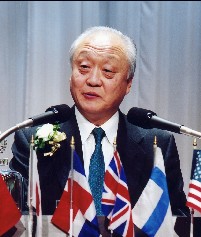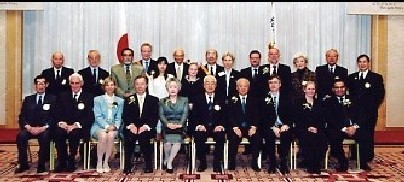"Japan��s Role on the International Scene in 2004"
February 18th, 2004
World Understanding Month Meeting
��Ladies�� Day��
Mr. Shunji Yanai
Former Japanese Ambassador to the United States
and presently a member of the faculty of the Law
School of Chuo University
and Director of the Mitsubishi Denki Co. Ltd.
 Rotary��s World Understanding Month was observed by the Tokyo Rotary Club at it��s regular meeting of February 18 which was a Ladies�� Day.
Rotary��s World Understanding Month was observed by the Tokyo Rotary Club at it��s regular meeting of February 18 which was a Ladies�� Day.
Former Japanese Ambassador to the United States and presently a member of the faculty of the Law School of Chuo University and Director of the Mitsubishi Denki Co. Ltd., Mr. Shunji Yanai spoke on Japan��s role on the international scene in 2004:
1. Problems the world faces in 2004.
There are some 50 disputes going on in the world today. The 9/11 terrorist attack shocked the world more then we can understand. It was called the second Pearl Harbor, but it was no precedent as the Japanese targeted only American bases, and not innocent civilians.
If 9/11 did not happen, it is doubtful whether the U. S. would have taken such a strong stance against the Iraqis.
Although Saddam Hussein has been captured, Osama bin-Laddin still remains at large, and the terrorist threat still exist.
Iraq remains unsettled, and North Korea still is not facing a solution.
We cannot take our eyes off Taiwan. There will be an election with a candidate from the Kuomintang threatening the incumbent. President Chen argues for an independent Taiwan, and the Chinese are nervous about this. In 1996 and 2000, the Chinese applied pressure during the elections, and in 1996 conducted military maneuvers. President Chen has stated he would like to take a national vote regarding an independent Taiwan.
Everyone is concerned about the Japanese and world economy, and things are looking somewhat better for Japan. Investment in homes and facilities are strong in the U. S. and the situation in China will become important.
The American election will take place in November, and will have a great importance to the world. The state of the American economy at the time, and the situation in Iraq will have a great impact on the election.
2. The Iraq issue.
There has been voices doubting the legitimacy of the Angla-USA forces going to war in Iraq before a decision by the Security Council. It is not that the Anglo-Americans are guilty, but the fault also rests with the Security Council who could not decide on the matter. It is difficult to decide from a legal standpoint, but politically, I believe it was the right decision. As we import 90% of our fuel from this region we cannot just stand by and it was correct that we send our Self Defense forces to the area.
3. The North Korean issue.
Dictator Kim��s rule is at the base of the problems and he is playing a dangerous game. The most critical issue is that of nuclear armament, and I do not believe that it will be resolved by the 6 nations parley starting on the 25th.
4. Long term issues.
The inability of the UN to move is a serious problem.
The heightening of competition form globalization is a threat to smaller countries. Ecology and poverty are still major problems, Security is also an issue not only of wars between nations and internal disputes but of large scale terrorism with the diffusion of nuclear arms. We must at any cost, stop nuclear weapons from falling into the hands of terrorists.
A few day��s after 9/11 I visited Assistant Secretary of State Armitage and discussed security measures with him. It was an informal consultation, so I did not disclose its contents to the Japanese media, but the following day it was reported that Armitage had told me to ��Show the flag��, which he did not say, which was quite strange. Then, a letter to the editor was printed which said that apparently I did not understand English as Iraq taken it to mean ��show the Japanese flag�� whereas the meaning was ��state clearly on which side you stand��
It is truly depressing to have a conversation which did not take place reported and then being criticized about it.
5. Japan��s role
I believe that Japan is taking a more positive stance in keeping the peace including the dispatch of our Self Defense forces abroad.
In diplomacy also, we have made efforts for peace in Cambodia and Bosnia.
The Self Defense forces have gone beyond peace keeping operations in their activities. We must increase our ODA funds, and together with China and South Korea must make regional efforts at cooperation. I believe there are two restraints to our peace making efforts and the two are the conditions set forth in Article 9 of our Constitution and the 3 Principles of Armament Exports. I think that our Constitution must be changed, but we must obtain a national consensus on the issue.
We must strengthen our national competitive power. Unless we reform not only our economic structure but also that of education, we will lose our competitiveness.
Finally, we must think of the extreme to happen, and must strengthen our missile defenses and our alliance with the United States.

��Guests of Honor��
H. E. Mr. Eero Kalevi Salovaara,
Ambassador Extraordinary and
Plenipotentiary of the Republic of
Finland
Mr. Peter Reinhardt,
Minister of the Embassy of Switzerland
Ms. Jane Owen,
Commercial Counsellor, Director of
Trade Promotion of the Embassy of
the United Kingdom
and Mr. David Donnelly,
Mr. Salah A. El-Sadek,
Counsellor of the Embassy of Egypt
Ms. Margot J. Carrington,
Cultural Affairs Officer of the Embassy
of the United States